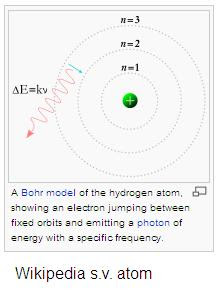
The story of the scientific discovery of the atom is quite interesting. Anaxagoras, a philosopher who lived in Athens about 2500 years ago, believed that an initial chaos was brought into form by a Mind (Nous). He suspected tiny particles to be the building blocks of nature but believed they were mixed together in unlike forms. He thought the Mind separated and organized the units.
Let us zoom now to the early 1800's. Scientists were studying gases and their properties linked with pressure, volume, temperature, etc. An Englishman named John Dalton discovered properties that led him to believe gas was made of atoms. He published his work in 1803.
But in 1900, scientists still did not agree on whether or not atoms exist! Chemists were becoming more convinced, due to Dalton's work. But physicists working on the study of heat, work and energy exchange of substances, called thermodynamics, were not convinced of atoms. They were thinking more in terms of fluid movement and, 100 years after Dalton, atoms did not fit their theories or expectations.
Enter Ludwig Boltzmann into the mix. He was a brilliant Austrian physicist, who taught at several universities. He came up with the idea that gasses may behave in a statistical way, dependent on probabilities that could be analyzed mathematically. Only if gas is made of atoms could this be true.
But, many physicists of the day would not hear of it. They would not publish Boltzmann's work as he wrote it and made interpretations of it to their own liking which took away his main points. He moved away from one university because of a rival who had a prominent name and position, and only returned when that rival retired. Sadly, in 1906, Boltzmann committed suicide.
In 1909, Earnest Rutherford's lab experimentally proved the existence of the atom with what was called the "gold foil experiment" (you can read details HERE). The experiment also led to the true structure of the atom, with positive charge in the inner area and negative charges surrounding it.
Boltzmann's analysis that gas can be understood statistically stands today, and has been used to build further knowledge.






No comments:
Post a Comment
Comments are moderated. You do not have to agree, but please be civil. Thanks for your interest.